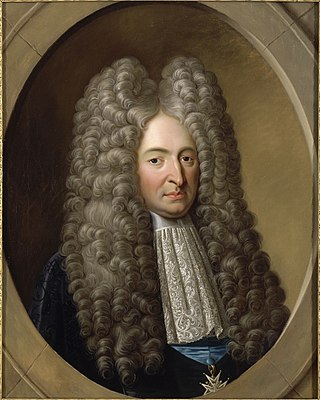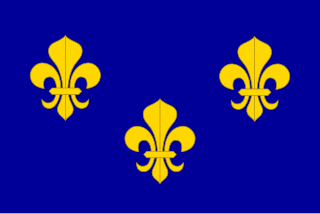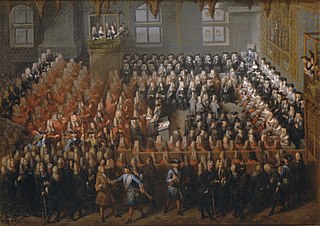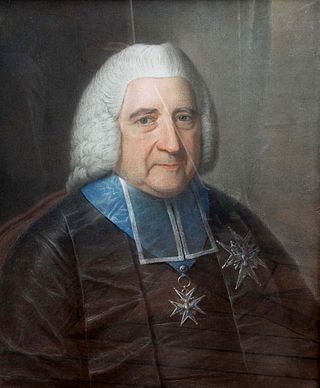Related Research Articles

Marie Antoinette was the last queen consort of France prior to the French Revolution and the French First Republic. Marie Antoinette was the wife of Louis XVI. Born Archduchess Maria Antonia of Austria, she was the penultimate child and youngest daughter of Empress Maria Theresa and Emperor Francis I. She married Louis XVI, Dauphin of France, in May 1770 at age 14. She then became the Dauphine of France. On 10 May 1774, her husband ascended the throne as Louis XVI and she became queen.

Louis XVI was the last king of France before the fall of the monarchy during the French Revolution. Marie Antoinette was the wife of Louis XVI.

Louis XV, known as Louis the Beloved, was King of France from 1 September 1715 until his death in 1774. He succeeded his great-grandfather Louis XIV at the age of five. Until he reached maturity in 1723, the kingdom was ruled by his grand-uncle Philippe II, Duke of Orléans, as Regent of France. Cardinal Fleury was chief minister from 1726 until his death in 1743, at which time the king took sole control of the kingdom.

Charles Louis de Secondat, baron de La Brède et de Montesquieu, generally referred to as simply Montesquieu, was a French judge, man of letters, historian, and political philosopher.

Henry IV, also known by the epithets Good King Henry or Henry the Great, was King of Navarre from 1572 and King of France from 1589 to 1610. He was the first monarch of France from the House of Bourbon, a cadet branch of the Capetian dynasty. He pragmatically balanced the interests of the Catholic and Protestant parties in France as well as among the European states. He was assassinated in Paris in 1610 by a Catholic zealot, and was succeeded by his son Louis XIII.

Michel Chamillart or Chamillard was a French statesman, a minister of King Louis XIV of France.

Charles Alexandre de Calonne, titled Count of Hannonville in 1759, was a French statesman, best known for being Louis XVI's Controller-General of Finances in the years leading up to the French revolution.

There is significant disagreement among historians of the French Revolution as to its causes. Usually, they acknowledge the presence of several interlinked factors, but vary in the weight they attribute to each one. These factors include cultural changes, normally associated with the Enlightenment; social change and financial and economic difficulties; and the political actions of the involved parties. For centuries, the French society was divided into three estates or orders.

René Nicolas Charles Augustin de Maupeou, marquis de Morangles was a French lawyer, politician, and chancellor of France, whose attempts at reform signalled the failure of enlightened despotism in France. He is best known for his effort to destroy the system of parlements, which were powerful regional courts, in 1770–74. When King Louis XV died in 1774, the parlements were restored and Maupeou lost power.

Under the French Ancien Régime, a parlement was a provincial appellate court of the Kingdom of France. In 1789, France had 13 parlements, the original and most important of which was the Parlement of Paris. Though both the modern French term parlement and the English word "parliament" derive from this French term, the Ancien Régime parlements were not legislative bodies and the modern and ancient terminology are not interchangeable.

The Kingdom of France in the early modern period, from the Renaissance to the Revolution (1789–1804), was a monarchy ruled by the House of Bourbon. This corresponds to the so-called Ancien Régime. The territory of France during this period increased until it included essentially the extent of the modern country, and it also included the territories of the first French colonial empire overseas.
Dévots was the name given in France to a group, active in both politics and social welfare, in the first half of the 17th century, which took a decisive part in the Catholic reform. It represented a perspective rather than a party. They shared a resistance to Protestant ascendancy, a nostalgia for the lost unity of Christendom, and an interest in social reforms in accordance with Christian morality.

The Parlement of Paris was the oldest parlement in the Kingdom of France, formed in the 14th century. It was fixed in Paris by Philip IV of France in 1302. The Parlement of Paris would hold sessions inside the medieval royal palace on the Île de la Cité, nowadays still the site of the Paris Hall of Justice.

Jean-Baptiste de Machault, comte d'Arnouville, seigneur de Garge et de Gonesse, He was a French statesman, son of Louis Charles Machault d'Arnouville, lieutenant of police.

The Kingdom of France is the historiographical name or umbrella term given to various political entities of France in the medieval and early modern period. It was one of the most powerful states in Europe from the High Middle Ages to 1848 during its dissolution. It was also an early colonial power, with colonies in Asia and Africa, and the largest being New France in North America centred around the Great Lakes.

The ancien régime was the political and social system of the Kingdom of France that the French Revolution overturned through its abolition in 1790 of the feudal system of the French nobility and in 1792 through its execution of the king and declaration of a republic. "Ancien régime" is now a common metaphor for "a system or mode no longer prevailing".
Steven Laurence Kaplan is professor emeritus and former Goldwin Smith Professor of European History in the Department of History at Cornell University, a lecturer at the Sciences Po Paris and at the prestigious École normale supérieure (ENS). His primary fields of expertise are French history, the history of markets, economic regulation, and political economy, and the history of food, specifically the history of bread, the grain trade and provisioning.
Colin David Hugh Jones is a British historian of France and professor of history at Queen Mary University of London.
Munro Price is a British historian noted for his award-winning work on French history.
Joseph Hugh Shennan was a British historian who was Professor of European Studies (1974–98) and Deputy Vice-Chancellor (1993–98) at the University of Lancaster. One of the pioneers in European Studies, his research focussed primarily on the history of France during the Ancien Régime as well as on the history of early modern Europe.
References
- 1 2 3 "Professor Julian Swann". Birbeck University of London. Archived from the original on 18 May 2015. Retrieved 16 May 2015.
- ↑ Andress, David (17 January 2015). The Oxford Handbook of the French Revolution. Oxford University Press. p. 72. ISBN 978-0-19-963974-8.
- ↑ Swann, Julian (6 April 1995). Politics and the Parlement of Paris Under Louis XV, 1754-1774 . Cambridge University Press. p. 4. ISBN 978-0-521-48362-9.